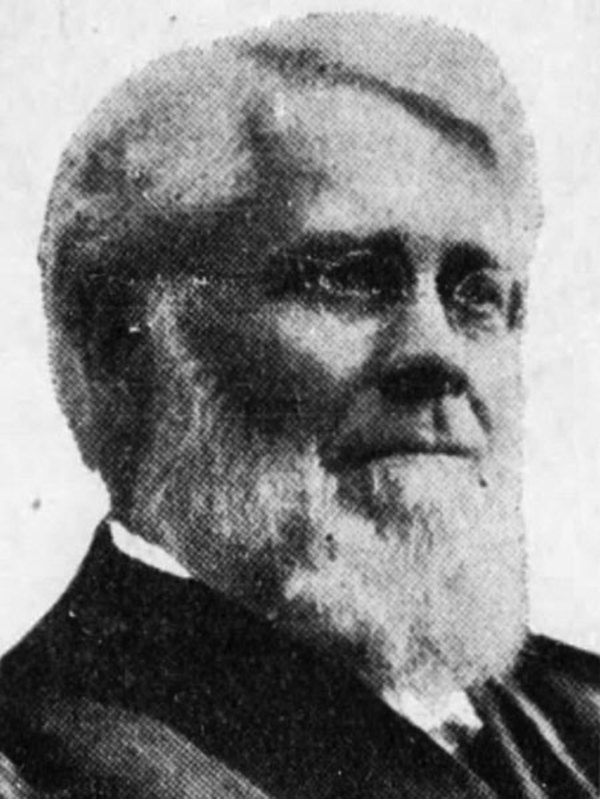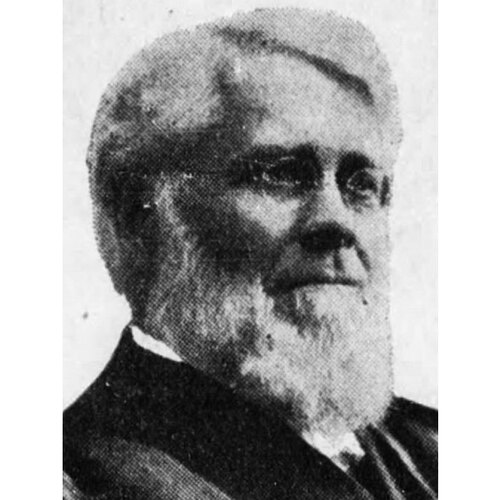
Source: Link
DU VAL, FREDERIC BEAL, Presbyterian minister, social reformer, and author; b. 21 May 1847 in Prince George’s County, Md, son of Edward Willet Du Val, a planter, and Mary Miller; m. 2 Nov. 1876 Corinne L. Kearfott (d. 1909) in Philadelphia, and they had four daughters and four sons; d. 15 May 1928 in Winnipeg.
Of Huguenot and Scottish ancestry, Frederic Du Val was raised in Maryland on a farm known as Floral Hill. As a young man he was sent to Washington, D.C., to work in a mercantile house. Educated at Hightstown Classical Academy in Hightstown, N.J., he went on to receive an ma in 1872 from nearby Princeton College, obtaining gold medals for oratory and debate and a first prize in biblical scholarship. He graduated from the Princeton Theological Seminary in 1875 and served as a Presbyterian minister in Wilmington, Del., and Toledo, Ohio. In 1886 he received a dd from the College of Wooster, in Wooster, Ohio.
Called in 1888 to succeed Daniel Miner Gordon as pastor of Knox Presbyterian Church in Winnipeg, Du Val would hold the post until 1916. His reputation as an outstanding orator, theologian, and moral reformer had preceded him. His sermons had emphasized the idea that the glory of God was best seen in the perfection of human character; this position led him into the Social Gospel movement.
At the time of Du Val’s arrival, Winnipeg was a frontier boom town with well-established brothels. Social reformers concentrated their attention on fighting for stricter controls on the liquor traffic and stiffer penalties for violations of the Sunday observance laws. The bordellos had formed a modus vivendi with the police whereby, despite city by-laws, they were allowed to operate with little interference. By 1900, however, as residential construction crept westward toward the red-light district on Thomas (Minto) Street, new residents began to complain. Real estate interests added their voices to the demands for action. This chorus reached a crescendo in 1902, the year in which Du Val was elected chairman of the Winnipeg Ministerial Association.
Described by historian James Henry Gray* as a “pint-sized zealot with a hard glinting eye and luxuriant chin whiskers,” Du Val led the campaign against the existence of a segregated district for prostitution. Through his sermons and public-speaking engagements, which had received widespread coverage in the local press, he had already made a name for himself. He had spoken against the Catholic school system from the time of his arrival in Manitoba and his opposition had increased after the Manitoba school question [see Thomas Greenway*] reared its head in 1890. He had also been a leader in the struggle for Prohibition. With his forceful personality and powerful oratory, he was “a one-man gang.” According to Gray, he soon had his fellow preachers “breathing fire and brimstone from the pulpits.” By 1903 they had turned their wrath from booze to brothels.
When his sermons failed to achieve the desired result, Du Val led his fellow ministers in mass action. “Segregation does not segregate and regulation does not regulate,” he thundered at one of several special meetings held in November 1903 and attended by hundreds. “It is inevitable that segregated areas become nests of crime.” The issue blew up during the mayoralty race of November–December 1903. Du Val and his supporters raised such an outcry that Winnipeg’s mayor, John Arbuthnot, withdrew his bid for a fourth term. The candidate Du Val supported, Thomas Sharpe, was elected almost by default and the reformers took over city hall. Raids were carried out on the brothels and segregation was abolished, but when these moves seemed only to scatter the prostitutes throughout the city’s downtown and make their elimination more difficult, Du Val began lobbying for increased police control. This also failed to stem the tide, particularly since the city continued to expand rapidly. Du Val persevered in demanding reform. He became a moving force in the Moral and Social Reform Council of Canada, founded in 1907. A federation of religious and social organizations, the league sought to influence municipal legislation, particularly on the question of prostitution.
In April 1909 the Winnipeg Police Commission decided to leave the regulation of brothels to the discretion of its chief of police. Chief John C. McRae favoured segregation, so he re-established a red-light district – on Annabella Street in the isolated Point Douglas (Winnipeg) area – with the cooperation of Winnipeg’s most powerful brothel keeper, Minnie Woods. By the following year the burgeoning population of the district had become difficult to contain. Du Val’s pamphlet, The problem of social vice in Winnipeg, which appeared in 1910, was a strong indictment of segregation. In November of that year the Reverend John George Shearer, one of the founders of the Moral and Social Reform Council of Canada, published a stinging criticism of the district in the Toronto Globe after he visited Winnipeg during a tour of western Canada. His denunciation provoked a public outcry in Winnipeg and resulted in the appointment of a royal commission, but municipal authorities managed to deflect much of the responsibility for the problem. In 1912 a series of police raids and arrests shut down numerous brothels, but segregated prostitution would continue in Winnipeg until the 1930s.
An eloquent writer as well as speaker, Du Val authored religious poems, only a few of which have survived. In 1899 he had been appointed to Manitoba College’s board of management; he would sit until 1926 and would also serve on the college’s senate. In 1901 he became a member of the council of the University of Manitoba. Seven years later he was elected to the joint committee on church union and in 1908–9 he was moderator of the General Assembly of the Presbyterian Church in Canada. He preached in various parts of Canada, including a sermon at the celebrations of the tercentenary of Quebec City in 1908 [see Albert Henry George Grey*].
After his retirement from Knox Presbyterian Church in 1916, Frederic Beal Du Val was named pastor emeritus. He remained in Winnipeg until his death in 1928 and was buried in Elmwood Cemetery. He was an important early figure in the Social Gospel tradition that would become associated with Winnipeg.
Frederic Beal Du Val is the author of The problem of social vice in Winnipeg (n.p., [1910]). Examples of his religious poetry are available in H. F. M. Ross, A brief sketch of the life of the Rev. Frederic B. Duval, d.d. . . . (Winnipeg, n.d.).
City of Winnipeg, Arch. and records control branch, City Council, minutes, July 1905, January 1906. Private arch., Robert Wardhaugh (Winnipeg), Interview with Frederic Duval, a grandson of the subject, Winnipeg, 16 Feb. 2000. Manitoba Free Press, 16–18 Nov. 1903; 9 Jan. 1904; 5 Jan. 1905; 21 Jan. 1907; 16, 19, 24 May 1914; 13 Dec. 1915; 18, 20 March 1916. Winnipeg Telegram, 18 Nov. 1903, 21 Jan. 1907. Winnipeg Tribune, 14 May 1928. Joy Cooper, “Red lights of Winnipeg,” Man., Hist. and Scientific Soc., Papers (Winnipeg), ser.3, no.27 (1970–71): 61–74. Directory, Winnipeg, 1910–40. J. H. Gray, Red lights on the prairies (Toronto, [1971]). W. L. Morton, Manitoba: a history (Toronto, 1957). H. A. Robson, Judge Robson on segregation or toleration of vice . . . the report of the Social Vice Commission, Winnipeg, January 11th, 1911 (Toronto, [1911?]). Margaret [Stovel] McWilliams, Manitoba milestones (Toronto and London, [1928]).
Cite This Article
Robert A. Wardhaugh, “DU VAL, FREDERIC BEAL,” in Dictionary of Canadian Biography, vol. 15, University of Toronto/Université Laval, 2003–, accessed March 1, 2026, https://www.biographi.ca/en/bio/du_val_frederic_beal_15E.html.
The citation above shows the format for footnotes and endnotes according to the Chicago manual of style (16th edition). Information to be used in other citation formats:
| Permalink: | https://www.biographi.ca/en/bio/du_val_frederic_beal_15E.html |
| Author of Article: | Robert A. Wardhaugh |
| Title of Article: | DU VAL, FREDERIC BEAL |
| Publication Name: | Dictionary of Canadian Biography, vol. 15 |
| Publisher: | University of Toronto/Université Laval |
| Year of publication: | 2005 |
| Year of revision: | 2005 |
| Access Date: | March 1, 2026 |



